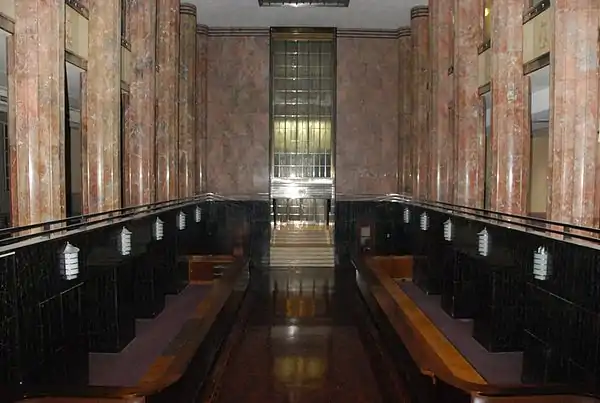
The banking hall at Mutual Building, Cape Town
A banking hall is traditionally the centre of banking activity in a bank where staff and customers meet surrounded by offices for managers and clerks.[1] It has been described as the "shop floor" of a bank.[2] Often built to an opulent standard, many banking halls are architecturally notable. In the twentieth century many banking halls were converted to retail or entertainment use due to their typically large size and central locations. The Counting House in Glasgow, for instance, which was built in the Victorian era[3] and once owned by the Royal Bank of Scotland, is now a Wetherspoons pub.[4]
References
- ↑ "London and South Western Bank. New Premises." The Bankers' Magazine, and Journal of the Money Market, Vol. 48, pp. 869-877 (p. 869).
- ↑ Abor, Joshua Yindenaba; Gyeke-Dako, Agyapomaa; Fiador, Vera Ogeh; Agbloyor, Elikplimi Komla; Amidu, Mohammed; Mensah, Lord (12 September 2019). Money and Banking in Africa. Springer. ISBN 9783319774589.
- ↑ Turner, T. "Glasgow Travel Guide 2023: Must-see attractions, wonderful hotels, excellent restaurants, valuable tips and so much more!".
- ↑ The Counting House. J. D. Wetherspoon. Retrieved 23 May 2023.
Further reading
- Belfoure, Charles. (2005) Monuments to Money: The architecture of American banks. McFarland. ISBN 9780786420605
External links
![]() Media related to Banking halls at Wikimedia Commons
Media related to Banking halls at Wikimedia Commons
This article is issued from Wikipedia. The text is licensed under Creative Commons - Attribution - Sharealike. Additional terms may apply for the media files.